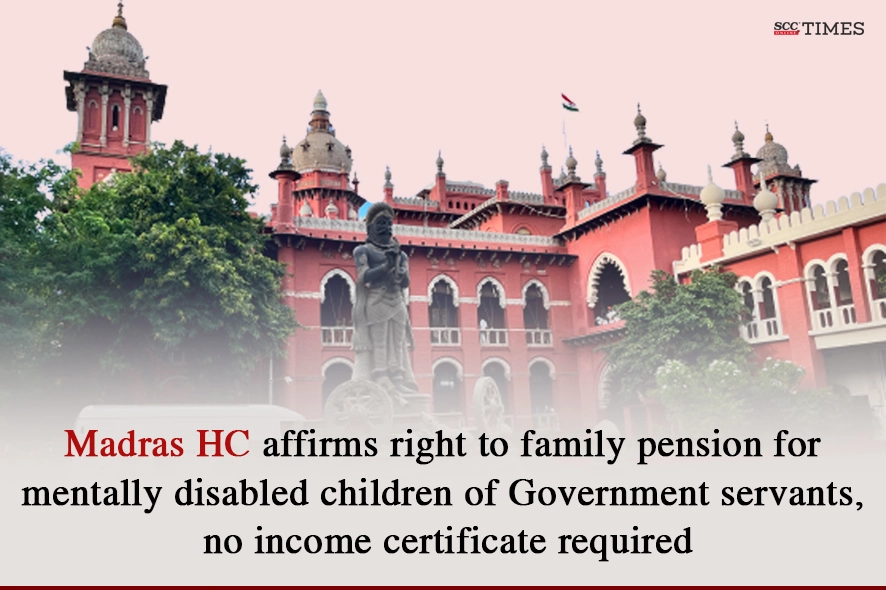Madras High Court: In a writ appeal filed seeking to expunge strong remarks made by a Single Judge Bench against the Principal Accountant General, while allowing a writ petition directing the disbursal of family pension to the mentally disabled child (respondent) of a Government servant, the Division Bench of G.R. Swaminathan* and K. Rajasekar, JJ. ordered that the remarks made against the appellant be expunged from the record. The Court further stated that child of a pensioner who is mentally disabled and falls within the scope of the pension rules is entitled to receive family pension, provided it is established that they are incapable of earning a livelihood. The Court made it clear that no insistence can be made for a certificate showing income from all sources, as it is not required by law.
Background
The respondent’s father was employed as a Forester under the control of the District Forest Officer. After becoming medically unfit, he was granted pension during his lifetime. Upon his death his wife continued receiving the pension. The respondent being mentally disabled, was under the care of by his elder brother. Subsequently, the elder brother approached the High Court through a writ petition, seeking family pension for the respondent. The petition was allowed by the Court. Followibng the order, the Principal Accountant General complied with the directive , but later filed the present appeal to expunge remarks made by the High Court in the writ petition while allowing pension.
Analysis and Decision:
The Court, gladly conceding the request in view of the post-order conduct of the appellant, directed that the remarks previously made against the appellant stand expunged. Further, the Court referred to Rule 54(6) of Central Civil Services (Pension) Rules, 1972, (‘Pension Rules’) according to which if son/daughter of a government servant is suffering from any disorder or disability of mind which render them incapable to earn livelihood, even after 25 years of age, then family pension shall be payable for life. The only requirement under the Rule is that such incapacity to earn must be evidenced by a certificate issued by a Medical Board. The Court further noted that there is no requirement to produce an income certificate duly noting the income from all sources. However, in the present case, the Principal Accountant General had insisted on furnishing such a certificate.
The Court held that when the statutory rule itself expressly requires only a certificate from a Doctor or Medical Board stating that the son or daughter of the deceased employee, due to mental or physical disability, is incapable of earning a livelihood, the authority has no power to demand anything beyond that. Any additional requirement, such as insisting on an income certificate denoting earnings from all sources, is not contemplated by the rules and therefore cannot be legally sustained.
The Court followed the judgment of Bhagwanti Mamtani v. Union of India, 1995 Supp (1) SCC 145 , to reaffirm that son/daughter of a pensioner who is mentally disabled and falls within the scope of the pension rules, is entitled to receive family pension upon submission of the medical certificate evidencing their incapacity to earn livelihood. The Court clarified that there is no requirement under the Rules to produce a certificate of income from all sources, and such a demand cannot be imposed when not prescribed by the statutory framework. It further held that the sanction order for pension must be passed without any delay after documents submitted in accordance with the statutory rules are submitted.
The Court emphatically reiterated that pension is a matter of right, not charity or bounty, and when the beneficiary is mentally disabled, the authorities must act with urgency and sensitivity. It stressed that alacrity in extending such benefits is essential to fulfill the benevolent purpose of the statutory pension rules, which are meant to provide continued support to dependents unable to sustain themselves.
The Court underscored that this entitlement is an extension of the right to life and dignity under Article 21 of the Constitution of India. Accordingly, it held that the mentally disabled son or daughter of a pensioner, who falls within the scope of the pension rules, must be granted family pension upon submission of a valid medical certificate evidencing incapacity to earn a livelihood. The Court made it clear that no insistence can be made for a certificate showing income from all sources, as it is not required by law. It further directed that the sanction order must be passed without delay once the documents prescribed under the statutory framework are submitted.
[Principal Accountant General (A&E) v. A.V. Jerald, 2025 SCC OnLine Mad 3182, decided on 19-6-2025]
*Judgment Authored by: Justice G.R. Swaminathan
Advocates who appeared in this case :
For Appellant(s): S. Mahalakshmi, Standing Counsel
For Respondent(s): N. Satheesh Kumar, Additional Government Pleader



